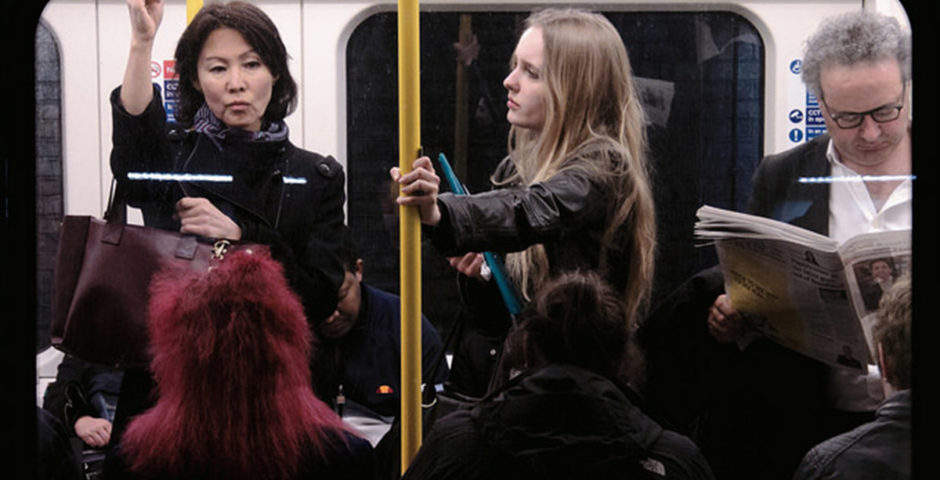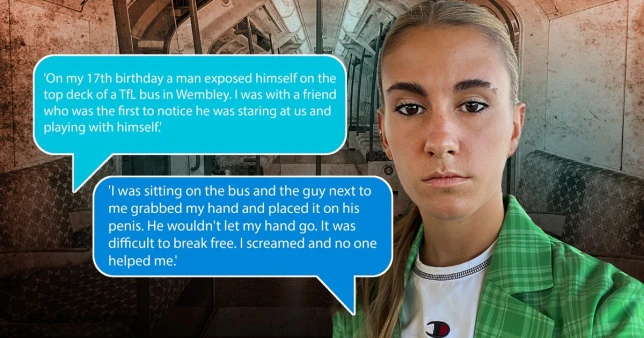Every day, women face disgusting behavior while just trying to get on with their lives.
Nearly 200 women have shared their experiences while travelling around London with sexual predators targeting them on all forms of public transport. Inspired by the murder of Sarah Everard, Zan Moon started an online movement ‘tackling rape culture in education’.
She founded Screengrab Them and compiled stories of everyday sexism from victims as young as 11 on Instagram. One woman told her: ‘Men repeatedly rub their groin on my body/ hand when on a packed tube. This happens often.’
Another said: ‘It only took me four days since moving to London for someone to grab my butt on the tube without my consent.’ Zan has written to London Mayor Sadiq Khan with a 19-page dossier detailing what women have experienced on the Tube, on a bus, walking home or while on their own. From 180 testimonials, 81% said people witnessed what happened to them but no one intervened.
Most women had been harassed on the Tube or a bus, or while walking home on their own. In an open letter to the Mayor, Ms Moon addressed ‘the hotbed of harassment that is Transport for London (TfL)’ with the hope to change his Tackling Violence Against Women and Girls strategy.
‘I asked people to contribute their stories via a Google form but I thought I will have only a few responses,’ the 24-year-old, who is based on north London said. ‘The majority show that harassment is not seen as a priority by TFL staff or the government.’
She wrote: ‘Our journeys are littered with everyday sexism. It should not be the case that women simply expect to be pestered, catcalled, barked at. ‘As I am sure you agree, it is shameful that this behaviour has been normalised on London travel. We need tangible change, and we need it now.
‘Communication campaigns and “See it, say it, sort it” flyers with a number to text BTP are inadequate (not just because the underground is the one place with zero service) but because the problem runs so deep that it needs much more than a few adverts to #speakup.’
Ms Moon has not taken any steps to verify the testimonials as she wants to give women the opportunity to remain anonymous. Over the last two weeks, she has also received several responses from men ‘taking the p**s’ out of harassment on public transport.

The activist said: ‘Ironically, their response perfectly summarises the attitudes of many perpetrators who see violence against women as something of a joke, to be belittled and ridiculed at any opportunity.’ Ms Moon hopes to persuade the mayor to meet with her to discuss how to fix this broken system.
Listing several practical ways to help, she stressed these are ‘mere band-aids over the real issue at hand’, which is the education of boys from primary school about misogyny.
‘I have given him practical changes that he has control over as a mayor,’ she said. ‘Hopefully, this brings justice to the number of women who have come forward.’ They include the constant presence of female police officers on TFL platforms and stations and more undercover police on Tube carriages during peak hours.
Ms. Moon also suggested that TFL should install ‘Harassment Panic Buttons’ on carriages, which would then alert officers. Her call comes after an investigation that revealed, less than 15% of all crimes reported to BTP through the 61016 service in 2021 actually resulted in successful prosecution.
Tackling misogyny at the root and educating children at a young age about how harmful it can be is something that Ms Moon has previously campaigned for. Last year, she compiled another file with dozens of sex abuse claims made by schoolchildren and sent it to heads of top public schools.
Using the power of social media, this time around the activist was inspired by her own personal experience. Back in January, Ms Moon and her girlfriend were harassed by a group of men in their 40s on the Tube, which inspired her to launch the survey.
They asked the two young women to have sex in front of them to prove they are lesbians and continued to yell at them and abuse them. Ms Moon’s repeated calls for help to other passengers were met with laughter, which left her feeling like ‘a piece of meat’.

‘I was quite traumatised by the experience, so I contacted British Transport Police but they told me that because the CCTV deletes after 72 hours, there was nothing they could do,’ she said. ‘That really upset me and angered me. It is such a small window for victims to come forward.’
Currently, sexual harassment training is being rolled out to all London Underground frontline staff, in line with training already received by enforcement and bus operations teams.
A spokesperson for the Mayor said he is working with TfL and the police to take a ‘zero-tolerance approach’ to all forms of sexual harassment across the whole network.
They added: ‘Sadiq is clear that violence and harassment towards women is a deep cultural problem in our society, and we must not simply respond to male violence against women and girls, but prevent it, which is why he continues to take action by funding initiatives to address the behaviour of at-risk offenders to prevent incidents happening.
‘A lot of work still needs to be done, but tackling violence against women and girls remains an absolute priority and the mayor is determined to ensure that every woman and girl is safe, and feels safe – whatever the time of day and wherever they are in the capital.’
The statement was also echoed by TfL, which stressed that it has ‘a bold and clear sexual harassment campaign’ on the network.
A spokesperson said: ‘As well as proactive police patrols taking place across public transport, we work with the police to pursue all sexual harassment offences using our extensive network of CCTV and will be continuing to deliver sexual harassment training to all frontline staff.’
Meanwhile, BTP also said that enhanced patrols of uniformed and specially trained plain clothes officers are taking place day and night across the network to identify offenders and reassure the travelling public.
A spokesperson said: ‘It’s vital that passengers continue to report these sorts of incidents to us for us to be able to take action – we can identify hotspot locations, target our patrols, and bring more offenders to justice.’


